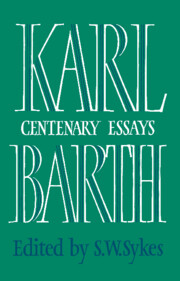Book contents
- Frontmatter
- Contents
- Note on the text
- 1 Introduction
- 2 Karl Barth's eschatological realism
- 3 The triune God and the freedom of the creature
- 4 Authority and openness in the Church
- 5 Ad Limina Apostolorum in retrospect: the reaction of Karl Barth to Vatican II
- 6 The reception of the theology of Karl Barth in the Anglo-Saxon world: history, typology and prospect
6 - The reception of the theology of Karl Barth in the Anglo-Saxon world: history, typology and prospect
Published online by Cambridge University Press: 26 February 2010
- Frontmatter
- Contents
- Note on the text
- 1 Introduction
- 2 Karl Barth's eschatological realism
- 3 The triune God and the freedom of the creature
- 4 Authority and openness in the Church
- 5 Ad Limina Apostolorum in retrospect: the reaction of Karl Barth to Vatican II
- 6 The reception of the theology of Karl Barth in the Anglo-Saxon world: history, typology and prospect
Summary
INTRODUCTION
There is a real sense in which an investigation of the ‘reception’ of the theology of Karl Barth would demand an examination of virtually the whole of the Christian (certainly the Protestant) theology of the twentieth century, besides mastery of the very considerable body of material written by Barth and published both during his lifetime and in the posthumous Nachlass. Our limiting strategy in the face of this complex and extensive requirement will be as follows: first, we shall articulate what can be understood as the ‘problem’ of the reception of the theology of Karl Barth; second, in elucidation of the origins of that reception, we shall examine its history in Britain and North America, using as a primary but not exclusive focus of attention the immediate interface of traditions to be found in the contemporary journals; third, on this historical basis we shall examine the theological assimilation of Barth in the period after the Second World War, using a ‘typology’ to represent the range and diversity of the manifestation of Barth's influence; fourth, in conclusion, we will find ourselves in a position to venture both the hypothesis that there has not in fact been a consistent, comprehensive reception of Barth's work which goes ‘through’, rather than ‘around’ it, and, beyond this, some suggestions as to what might be the necessary conditions for an adequate reception of Barth's work.
- Type
- Chapter
- Information
- Karl BarthCentenary Essays, pp. 115 - 171Publisher: Cambridge University PressPrint publication year: 1989



